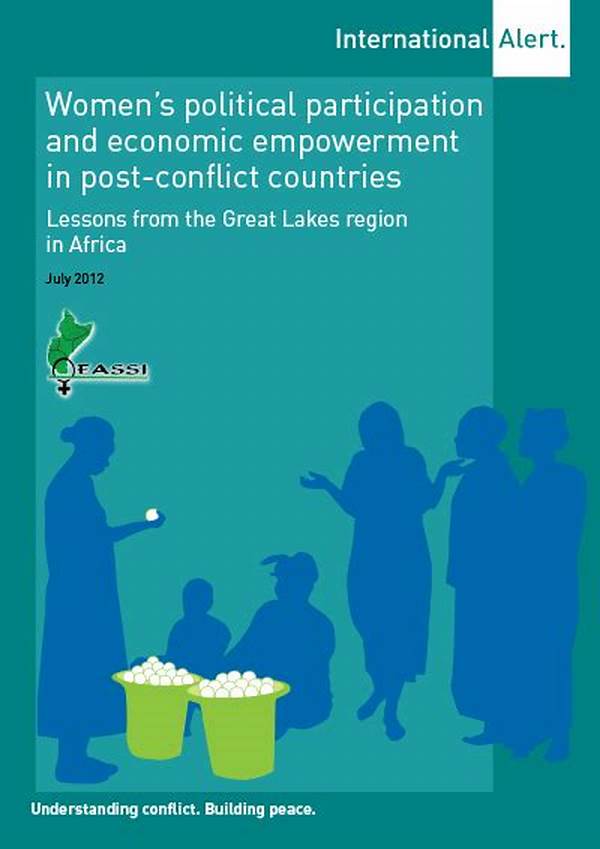Challenges and Opportunities
Economic empowerment in post-conflict regions is a multifaceted issue, often characterized by a blend of challenges and opportunities. War and conflict leave profound impacts on society, infrastructure, and the economy. In these areas, rebuilding is crucial and often requires concerted efforts from both local and international entities to stimulate economic growth and provide sustainable livelihoods. The lack of stable infrastructure and social turmoil can impede these efforts, making the path to economic development arduous. However, the post-conflict period can also present unparalleled opportunities for economic empowerment. New economic policies, investments, and rebuilding efforts can foster an environment conducive to growth. By prioritizing inclusive economic practices, the empowerment of disadvantaged groups, such as women and youth, can be realized, contributing to a stronger, more diverse economic base. Well-designed economic empowerment initiatives can stimulate job creation, enhance skills, and build resilience in communities, ultimately fostering long-term stability and growth in post-conflict regions.
Strategies for Economic Development
1. Establishing a robust legal and institutional framework is critical for economic empowerment in post-conflict regions. Strong institutions promote justice, protect property rights, and build confidence among investors and local entrepreneurs.
2. Encouraging private sector investment is essential for stimulating economic activity in post-conflict regions. Economic empowerment initiatives can create a conducive environment for both domestic and foreign investments.
3. Capacity building and vocational training are fundamental for enhancing human capital. Economic empowerment in post-conflict regions should focus on equipping individuals with skills that are in demand in the evolving job market.
4. Infrastructure development facilitates connectivity and trade, which are vital for economic recovery. Economic empowerment efforts in post-conflict regions should prioritize rebuilding roads, bridges, and communication networks.
5. Fostering microfinance and entrepreneurship grants individuals access to capital, enabling them to start businesses and generate income. Economic empowerment in post-conflict regions benefits from these grassroots economic activities.
Role of International Organizations
International organizations play a pivotal role in promoting economic empowerment in post-conflict regions. Their involvement often includes providing financial assistance, expertise, and capacity-building programs tailored to local needs. These organizations collaborate with governments and local communities to design and implement sustainable development projects aimed at fostering economic resilience. They bring in technical expertise and resources, which enhance local efforts in rebuilding infrastructure, improving governance, and developing human capital. International aid, when channeled appropriately, can significantly enhance economic empowerment by addressing critical bottlenecks in economic recovery, such as education, health, and infrastructure. However, it is paramount that these initiatives are aligned with local priorities and contexts to ensure ownership and sustained impact.
Community-Led Initiatives
Economic empowerment in post-conflict regions is greatly bolstered by community-led initiatives. Empowering local communities to actively participate in decision-making processes ensures that development projects address their specific needs and contexts. Community-driven initiatives often lead to more sustainable outcomes as they leverage local knowledge and networks. By fostering a sense of ownership and accountability, these efforts ensure that the benefits of economic development are equitably distributed among community members. Examples include cooperative businesses, community savings groups, and participatory governance models, all of which can drive grassroots economic growth and social cohesion. Additionally, community-led ventures help bridge the gap between local needs and larger development frameworks, making them indispensable in the process of rebuilding post-conflict societies.
Education and Skill Development
Education and skill development are cornerstones of economic empowerment in post-conflict regions, as they pave the way for increased employment opportunities and poverty reduction. Rebuilding educational infrastructure and ensuring access to quality education are imperative. Vocational training programs tailored to market needs can significantly enhance employability and spur entrepreneurship. By investing in education, societies can cultivate a skilled workforce capable of driving long-term economic prosperity. Education also bolsters peacebuilding efforts by fostering mutual understanding and tolerance. A well-educated population is better equipped to participate in democratic processes and contribute to sustainable development, thus laying the groundwork for a more resilient and empowered post-conflict society.
Women’s Economic Empowerment
Women play a crucial role in the economic empowerment of post-conflict regions. Empowering women economically not only enhances gender equality but also contributes to overall economic growth and stability. Ensuring equal access to resources, education, and employment opportunities for women can transform social norms and foster inclusive development. Women tend to invest more in their families and communities, thus amplifying the socioeconomic impacts of their empowerment. Policymakers and stakeholders must focus on removing barriers that hinder women’s economic participation, such as discriminatory laws, unequal access to credit, and safety concerns. By fostering an enabling environment, post-conflict regions can unlock the potential of their female population, contributing significantly to their economic revitalization.
Summary
In summary, economic empowerment in post-conflict regions is a fundamental aspect of rebuilding and achieving long-term stability and prosperity. It requires a comprehensive approach that addresses immediate needs while laying the foundation for sustainable development. International organizations, local governments, and communities play vital roles in these efforts, necessitating collaboration to maximize impact. Sustainable development initiatives should prioritize inclusivity, ensuring that marginalized groups receive equitable opportunities. Education, skill development, and infrastructure are key components of economic empowerment, providing a pathway to self-reliance and innovation. By focusing on these elements, post-conflict regions can transform challenges into opportunities, fostering resilience and growth. The empowerment of women and youth, in particular, augments social cohesion and economic diversity, positioning societies to thrive in the aftermath of conflict. Ultimately, economic empowerment is not just a means to recovery but a critical pillar for peace and sustainable development in post-conflict regions.





